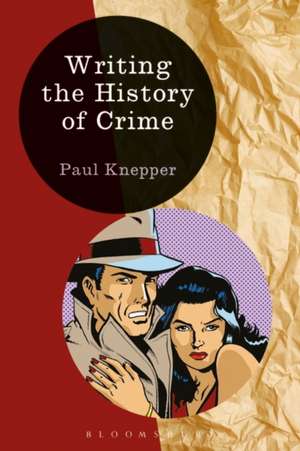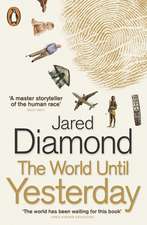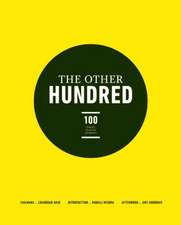Writing the History of Crime: Writing History
Autor Professor Paul Knepperen Limba Engleză Paperback – 16 dec 2015
| Toate formatele și edițiile | Preț | Express |
|---|---|---|
| Paperback (1) | 179.56 lei 6-8 săpt. | |
| Bloomsbury Publishing – 16 dec 2015 | 179.56 lei 6-8 săpt. | |
| Hardback (1) | 773.81 lei 6-8 săpt. | |
| Bloomsbury Publishing – 16 dec 2015 | 773.81 lei 6-8 săpt. |
Preț: 179.56 lei
Preț vechi: 220.21 lei
-18% Nou
Puncte Express: 269
Preț estimativ în valută:
34.36€ • 37.31$ • 28.86£
34.36€ • 37.31$ • 28.86£
Carte tipărită la comandă
Livrare economică 22 aprilie-06 mai
Preluare comenzi: 021 569.72.76
Specificații
ISBN-13: 9781472518521
ISBN-10: 1472518527
Pagini: 248
Dimensiuni: 156 x 234 x 18 mm
Greutate: 0.39 kg
Editura: Bloomsbury Publishing
Colecția Bloomsbury Academic
Seria Writing History
Locul publicării:London, United Kingdom
ISBN-10: 1472518527
Pagini: 248
Dimensiuni: 156 x 234 x 18 mm
Greutate: 0.39 kg
Editura: Bloomsbury Publishing
Colecția Bloomsbury Academic
Seria Writing History
Locul publicării:London, United Kingdom
Caracteristici
Covers legal, scientific, social, cultural, gender, colonial and international approaches to the subject among others
Notă biografică
Paul Knepper is Professor of Criminology at the University of Sheffield, UK.
Cuprins
Introduction1. Legal History: Crime or Criminal Justice?2. Statistics, Trends and Techniques3. Mind and Body, Civilisation and Evolution4. The British Marxist Historians5. The City: Underclass, Underworld and Urban Disorder6. Foucault and the Cultural Turn7. Women's History, Feminist Perspectives8. Colonialism, Globalisation and InternationalismConclusionPostscript: The Criminology of TimeBibliographyIndex
Recenzii
The evaluation, breadth, depth and chronology of subject matter and integration of commentators' perspectives (past and present) is astounding ... The embedded knowledge and cognition displayed here is humbling and could only have been produced by someone who is most genuinely and assuredly not just a crime history specialist but an 'expert crime history expert'; Knepper therefore more than deserves his place amongst the literary greats and academics he references ... The book is an outstanding compendium of the history of crime and the criminal justice process ... [It] is therefore the 'go to' book and 'must read' for not only those starting out on their journey to study and research the history of crime, but for all of us interested and engaged in this work.
Knepper's book is impressive in its extensive knowledge of international English-language research. It is clearly structured with an eye towards the essentials, and is successfully didactic in its manner not least due to the summaries at the end of each section. ... As an initial introduction to the topic, this book is highly recommended.
Engaging and well informed, Paul Knepper's Writing the History of Crime synthesizes a large, fragmented body of scholarship, identifying core methodological, theoretical, and substantive debates. The volume is accessible enough to provide a valuable and clear introduction for advanced students, but it is insightful enough to offer an important state-of-the-field assessment for scholars. This is a terrific book.
Drawing a dazzling number of studies into the discussion, Paul Knepper shows an unparalleled command of the literature. Along the way, he makes some unexpected but always refreshing associations between subgenres and he quickly introduces the reader into the core of theoretical debates. This book is a must for anyone wishing to make an acquaintance with the burgeoning field of the history of crime.
Engagingly written and accessible to non-specialists, Writing the History of Crime provides a detailed and innovative analysis of the development of criminal justice history. Far more than just a synthetic overview, the book ranges widely, comparing and contrasting works from multiple countries and a range of academic disciplines. A major strength is the way it situates criminal justice history within broader trends in historical writing. Clearly and logically organised, this work is likely to become a standard point of reference in the field.
In this brief but encyclopedic study Paul Knepper sets out to show how scholars from around the world have written the history of crime. Part history of the history of crime, part meditation on how historians have conceptualized crime's historical significance, the study is a handy introduction to the important scholarship on crime and criminal law. Its astonishing breadth, however, means Knepper's work also makes an original contribution by putting the history of crime in comparative and transnational contexts. Students entering the field will find the book a useful introduction to major works and issues; established scholars will benefit as much from Knepper's ability to put familiar studies in larger, less familiar conversations.
The book is a very useful and well organized introduction to the history of crime, and how it has been approached and developed by different historical schools. A very good introduction for students of history who want to start engaging with the history of crime and its methodology.
[Writing the History of Crime] summarises key historiographical debates and research in an accessible and easy to follow manner.
Knepper's book is impressive in its extensive knowledge of international English-language research. It is clearly structured with an eye towards the essentials, and is successfully didactic in its manner not least due to the summaries at the end of each section. ... As an initial introduction to the topic, this book is highly recommended.
Engaging and well informed, Paul Knepper's Writing the History of Crime synthesizes a large, fragmented body of scholarship, identifying core methodological, theoretical, and substantive debates. The volume is accessible enough to provide a valuable and clear introduction for advanced students, but it is insightful enough to offer an important state-of-the-field assessment for scholars. This is a terrific book.
Drawing a dazzling number of studies into the discussion, Paul Knepper shows an unparalleled command of the literature. Along the way, he makes some unexpected but always refreshing associations between subgenres and he quickly introduces the reader into the core of theoretical debates. This book is a must for anyone wishing to make an acquaintance with the burgeoning field of the history of crime.
Engagingly written and accessible to non-specialists, Writing the History of Crime provides a detailed and innovative analysis of the development of criminal justice history. Far more than just a synthetic overview, the book ranges widely, comparing and contrasting works from multiple countries and a range of academic disciplines. A major strength is the way it situates criminal justice history within broader trends in historical writing. Clearly and logically organised, this work is likely to become a standard point of reference in the field.
In this brief but encyclopedic study Paul Knepper sets out to show how scholars from around the world have written the history of crime. Part history of the history of crime, part meditation on how historians have conceptualized crime's historical significance, the study is a handy introduction to the important scholarship on crime and criminal law. Its astonishing breadth, however, means Knepper's work also makes an original contribution by putting the history of crime in comparative and transnational contexts. Students entering the field will find the book a useful introduction to major works and issues; established scholars will benefit as much from Knepper's ability to put familiar studies in larger, less familiar conversations.
The book is a very useful and well organized introduction to the history of crime, and how it has been approached and developed by different historical schools. A very good introduction for students of history who want to start engaging with the history of crime and its methodology.
[Writing the History of Crime] summarises key historiographical debates and research in an accessible and easy to follow manner.


























